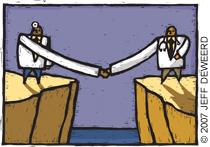
When facing the pain of a malpractice lawsuit, physicians need the compassion and support of their colleagues.
Fam Pract Manag. 2007;14(10):52
Dr. Cohen is a family physician in private practice and an adjunct faculty member at St. Peter Family Medicine Residency, Olympia, Wash. Author disclosure: nothing to disclose.

I was sued for malpractice nearly two years ago. For months, only those who needed to know – my partners, the other physicians involved and my wife – knew about my little secret. I even kept this dark and shameful information from my parents and sister until the last month of the ordeal. At some point during medical school and residency, I inherited the notion that malpractice suits were things that should not be spoken of in general conversation.
My conflict ended a number of months ago, and I've since had time to reflect on malpractice suits in general and how we, as a profession, deal with them. I have seen too many of my mentors and role models stop practicing clinical medicine because of “burnout” or they “just needed a change,” although everyone knew the real cause was one too many lawsuits brought against them, which eroded their passion for patient care. They too must have felt the anger, shame, depression and embarrassment that I did. I had seen the wounded among us, and I became one of them, left alone and unable to share my experience with others.
Those physicians who have not yet been sued may be surprised to learn what a web of conflicting emotions it elicits. One moment I felt shame and self-pity, while the next moment I felt sadness and sympathy for those who had sued me because something bad did happen, regardless of culpability. Moments later, the compassion turned to anger at those who sued me for betraying me and my best efforts.
Oh, there was plenty of anger to go around. I was angry with the legal system for operating at a glacial pace while expecting physicians to make dozens of critical decisions without flaw during our brief, hurried encounters with patients. I felt anger and disgust at the expense of my own defense in the form of lawyer fees, focus groups and video conferences in preparation for trial. But the greatest anger I felt was targeted at myself. I was annoyed that I couldn't just “suck it up” and deal with the lawsuit and, instead, bordered on self-pity and self-imposed isolation. I was angry for the decisions I had made in the past, even though they may have been clinically sound, and angry for involving others in such a disastrous mess. And I was angry and disappointed with myself for the way I treated my family, as I would brood around the house and quickly snap when asked to take out the garbage or read a bedtime story.
My malpractice suit is over now. Despite my own personal pain and suffering from being sued, I honestly can say that I'm a better person for it. I consider myself more self-enlightened, aware of my motivations for continuing to practice medicine. My practice style has changed a little, not a lot, and probably for the better. I am more cautious at times, but not so much that I'm paralyzed to make decisions without a blood test or X-ray. I don't document my chart notes with more or less detail, but I do document more wisely with a better understanding of what attorneys see when they look at a chart.
Perhaps the biggest lesson I've taken away from the experience is that until we, as a profession, learn how to appropriately come to the aid of our colleagues who are dealing with the pain of the malpractice process, physicians will continue to fall by the wayside.
There is only so much we can do to bring about tort reform and liability reform in our litigious society. While we can and should lobby for a rational and reasonable system of compensation for medical errors, it is unlikely to happen soon. In the meantime, however, we can change how we treat our embattled colleagues. We can offer them our compassion and support without becoming overly involved or passing judgment. And we can break the culture of silence.